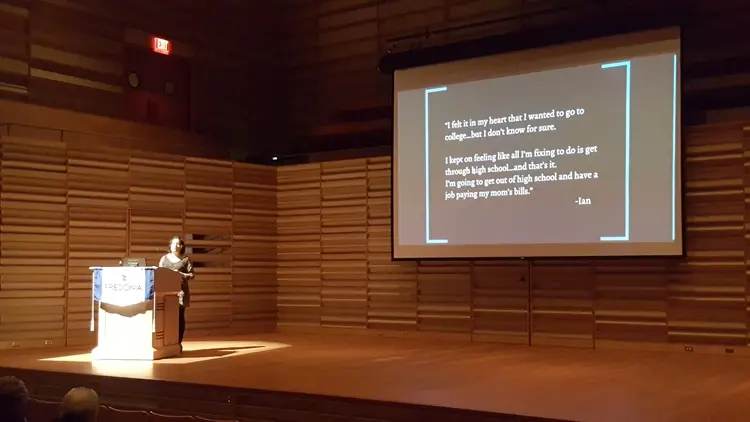



As part of Fredonia’s effort to address the issue of college affordability, a noted researcher and author presented her thought-provoking findings to an audience in Rosch Recital Hall Nov. 30.
“I saw a lot of the challenges that families are talking about today, but I also saw a lot of things that we have not been talking about,” said Dr. Sara Goldrick-Rab, who has spent the last 15 years studying and writing about how and why some students realize their dreams of diplomas while the dreams of others drown in pools of debt. She is a professor of Higher Education Policy and Sociology at Temple University in Philadelphia, and previously taught at the University of Wisconsin-Madison.
She worked with a team of researchers to follow students as they tried to pay for college over a six-year span. “Suffice (it) to say that money matters a lot to how people experience college, and it probably matters even more than we give it credit for,” Dr. Goldrick-Rab said. “I don’t think we realized how much it’s holding back students who are very talented, but don’t have enough money to pay the bills.”
Fredonia realizes it, and administrators are looking at all options to deal with it. “Sara is here because we are extending awareness and understanding of cost and affordability beyond the Office of Financial Aid to include all faculty, advisors, staff and administrators,” said Provost and Vice President for Academic Affairs Terry Brown. A group of 25 faculty, staff, and administrators have read Goldrick-Rab’s new book, “Paying the Price: College Costs, Financial Aid, and the Betrayal of the American Dream.” According to Dr. Brown, changes are in the works as a result. “For example, we are appointing a group of faculty, staff, and students to implement specific tactics to help make textbooks more affordable,” she said.
Universities have long used academic excuses to avoid dealing with the societal and/or financial problems students are facing, according to Goldrick-Rab. “We’ve been overlooking the extent to which some people are going without enough food to eat or a safe place to live in order to be in school,” she said. “I don’t think the public is aware that there are homeless college students today. I think we should be taking note of that and trying to serve those students so we can keep them in school and complete their degrees and not pretend they’re dropping out because they couldn’t do math.”
Fredonia students are fortunate in that the college has one of the most innovative and proactive offices of Financial Aid in SUNY. “Fredonia's Financial Aid Office was the first four-year in SUNY to pilot the web based SmartTrack Financial Literacy platform along with the communication and engagement plan that targets first-year student loan borrowers,” said Associate Vice President for Enrollment Services Dan Tramuta. As a result of the efforts of the financial aid staff, Fredonia’s student loan default rate is below the SUNY average.
Goldrick-Rab is pleased to see Fredonia’s invitation to speak was more than just a symbolic gesture. “Public colleges and universities are where the heart of this challenge is,” she said. “So one of the questions I had when I released this book was ‘how would they respond?’ Would they engage and have the hard conversations about what to do given these problems, or would they shy away from it? I knew from the invitation that Fredonia was going to step up and try to do something.”
There are other ways Fredonia is “stepping up” to address this issue. Conversations are happening across campus to lower the cost of housing, according to Vice President of Student Affairs Cedric B. Howard. “Fredonia has also received funding from SUNY to completely overhaul the way we schedule courses in order to bring down the cost of instruction and to help students complete their degrees,” said Dr. Howard. “We are scrutinizing every fee that we charge the students, line by line, so that we are not unnecessarily passing on our costs to students.”